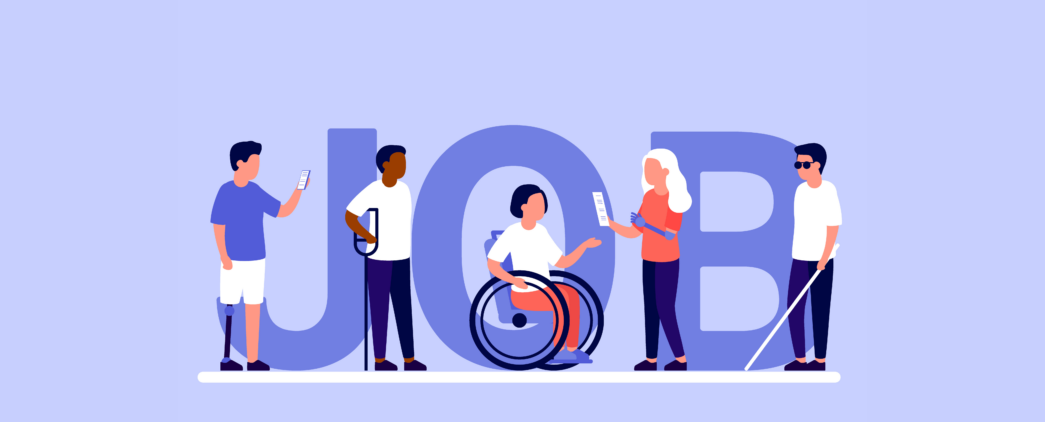Supporting Employees with Accommodations
The Sierra Group provides insight into inclusive hiring practices

At Tamman, we’re passionate about closing the employment gap between people with disabilities and those without. We wrote about five steps that employers can take to make their hiring processes more inclusive to people with disabilities.
But let’s face it: disability is a tricky topic to talk about with employees and prospective hires. We’ve been there too. How do we bring it up without getting into legal trouble? And how do we make sure that we’re offering the right accommodations?
We called Tamman’s strategic partner, Janet Fiore, for guidance. Janet is an expert on employment and disability, and she founded the Sierra Group in 1992. The Sierra Group and Tamman work together to provide holistic, “360°” services to companies who want to expand their accessibility and inclusion practices. The Sierra Group has been training companies on disability inclusion and providing accommodations support for over 30 years, so Janet has a lot of expertise to share.
Offering accommodations
Janet emphasized that the most important thing employers can do is to talk about disability and offer accommodations rather than merely asking employees or prospective hires to disclose. “My number one suggestion is to always offer to accommodate everyone and to make that offer at every available time.” While that may seem like a big ask, Janet provides some specific examples. Begin with offering accommodations during the hiring process. During meetings, offer them to all new hires, regardless of position level. The offer should be paired with a clear pathway to request reasonable accommodations.
Why offer? “It’s telling anyone with a disability, ‘Hey, it’s okay if I ask. They’re offering for me to ask for what I need.’ It’s making sure everyone knows this employer is willing to accommodate.” says Janet.
2024 data from employers surveyed by the Job Accommodations Network (JAN) shows that half of all accommodations offered cost employers $0. Accommodations also led to increased retention, productivity, and morale.
Additionally, Janet sees companies succeed when they provide disability awareness training to their entire workforce and supplemental training to their recruiters. This allows everyone to talk about disability without hesitation. It also informs everyone on how to go through the interactive accommodations process.
Self-identification and self-disclosure
So, when should companies actually ask employees or prospective hires about their disability status? Janet explains that there are two different instances.
The first is self-identification (sometimes called self ID). The voluntary self-identification of disability was introduced by the U.S. Department of Labor’s Office of Federal Contractor Compliance Programs in 2014, with the goal of increasing the percentage of employees with disabilities among federal contractors. (By law, federal contractors must strive to make sure that at least 7% of their employees are people with disabilities.) If your company does business with the federal government, you’re required to ask job applicants to complete this form and keep it entirely separate from their application materials. Federal contractors must also ask their existing staff to complete the form once a year. However, it’s entirely optional for applicants and staff to complete the form.
Janet compares voluntary self-identification to a “census.” It’s a “broad request” and “not personal to anyone,” and it’s designed to help an employer understand where they’re at on inclusion metrics. She notes that some companies that don’t contract with the federal government have implemented an anonymized annual census modeled after the form to understand where they’re at on disability inclusion, too.
The second point at which employers should ask about disability is self-disclosure. The process of self-disclosure is separate because it allows a person to request accommodations from a company’s HR or operations department. Janet suggests encouraging self-disclosure by promoting accommodations proactively across the company.
Once a person discloses their disability to the employer, they start a process to find the accommodations that work best for them. It’s critical that this process be interactive and focused on the employee’s success rather than on “proving” their disability or submitting medical paperwork. Creating a “human-centered” approach can benefit both workers and employers.
“Having support from an accommodations expert can be really helpful,” says Janet. “People with disabilities know what they need, but they may not know about all of the options out there.” Additionally, it can feel scary and risky for someone to disclose. An accommodations expert provides support in finding solutions that work for both the employee and the employer. “If you’re a worker fearing loss of your job, you shouldn’t have to be the only resource to answer that question [about accommodations],” notes Janet.
Ensuring employees thrive
With the right training, support, and accommodations, Janet has seen employers and employees thrive in her 30 years leading Sierra Group. Physical and attitudinal barriers toward accommodations are decreasing. This is paving the way for greater employment opportunities for people with disabilities. In our conversation, she shared a recent success story. The Sierra Group partnered with a manufacturing company to make sure that all of its employees received the accommodations they needed. After hiring a Deaf individual who was struggling with written training materials, Sierra worked with him to provide access to an ASL interpreter for key trainings and meetings. He’s since excelled in his new role and has been promoted twice. The biggest barrier that Janet sees in the workforce now? Digital accessibility. That’s why Tamman and Sierra work closely together to create end-to-end employment pathways for people with disabilities and partner companies. Learn more about our partnership and how we can support your DEIA work.





